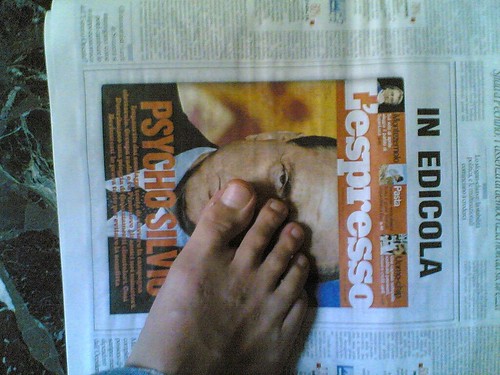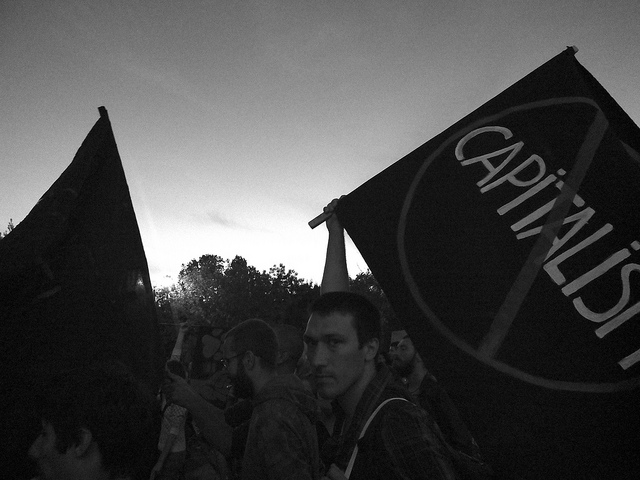Ethical Space, Vol 7 Nos. 2/3, 2010
 Natascha Fioretti examines Italy’s extraordinary ‘Berlusconismo’ phenomenon – and the response of the international media to it.
Natascha Fioretti examines Italy’s extraordinary ‘Berlusconismo’ phenomenon – and the response of the international media to it.
When elements of popular culture meet elements of political culture, the resulting combination falls into a category entitled ‘pop politics.’ According to Gianpietro Mazzoleni and Anna Sfardini (2009), strategies for managing politics and communications in Western democracies underwent profound changes in the last thirty years. Instead of thinking in terms of objective, factual information, today we think in terms of ‘infotainment’ (information combined with entertainment) and instead of thinking in terms of pure politics we think in terms of ‘politainment’ (politics combined with entertainment).
As a result, the political system and its actors have become more confident in using the media as a megaphone while the media quickly learned how to profit from putting the political class with its public and private stories in the attention cycle. Like a dog biting its tail, they set the information agenda. By doing so, politicians have largely improved their communicative skills, their knowledge of the media system and its rules as well as the ability to use the media to their own advantages. This led to the ‘personalisation of political leadership’, a phenomenon that gave birth to political personalities such as Barack Obama, Nicolas Sarkozy and Silvio Berlusconi.
Personalisation of political leadership
Following the thesis of Mazzoleni and Sfardini (ibid), trends such as the personalisation of political leadership, the popularisation of news and of the political agenda affect all Western democracies. Nevertheless, reading the international news of the last ten months some democracies seem to be affected more than others.
An example: when in October 2009 the Italian court ruled Silvio Berlusconi’s immunity law from prosecution as unconstitutional, all the media attention was on Italy. The day after reading the headlines of international newspapers it was clear that the decision of the court was welcomed on all sides: the English press’s headlines read: ‘Berlusconi’s legal immunity stripped by Italy’s top court’ (the Independent), ‘Italian court rules Berlusconi’s immunity law unconstitutional’ (the Guardian), ‘Defiant Berlusconi is back in the dock after Italian court strips premier of legal immunity’ (Daily Mail), ‘Italian Court Rejects Prime Minister’s Immunity’ (The New York Times).
In contrast, the German press wrote: ‘Berlusconi ist endlich Einhalt geboten worden’ (‘Finally Berlusconi has been stopped’, Die Zeit), ‘Berlusconi wird wieder angreifbar’ (‘Berlusconi becomes assailable again’, Der Tagesspiegel), ‘Berlusconi verliert Immunität’ (‘Berlusconi loses immunity’, Süddeutsche Zeitung). In Spain, El Pais headlined its report: ‘El Constitucional echa por tierra la ley de inmunidad que protege a Berlusconi’ (‘The constitutional court discarded the immunity law protecting Berlusconi’) while in France Le Monde’s headline ran: ‘La cour constitutionnelle italienne invalide la loi d’immunité protégeant Berlusconi’ (‘The constitutional court discarded the immunity law protecting Berlusconi’) and Libération’s: ‘L’immunité pénale de Berlusconi invalidée’ (‘The immunity law of Berlusconi discarded’).
This is only one of many cases. The same occurred when Italian Prime Minister Silvio Berlusconi was suspected of having an  affair with a young girl from Naples and later with the escort, Patrizia Daddario. Whether for private, public, political, business or judiciary affairs, he is constantly in the media. And not only do the media constantly observe his actions, but academic and scientific circles follow him as well. Last February, the Department of Politics and International Studies at the Open University, Birmingham, along with OpenDemocracy and Italian think-tank Vision organised a day-long conference entitled ‘Beyond Berlusconi: Prospects for Italy’. Event participants included well-known journalists, academics and policy-makers. Among them were Bill Emmott, former editor of the Economist; Daniele Albertazzi, senior lecturer in European media at Birmingham University and author of Resisting the tide: Cultures of opposition under Berlusconi 2001-2006; Francesco Grillo, director of Vision; Geoff Andrews, leading authority on Italian politics and a regular media commentator on Italian current affairs and author of Not a normal country: Italy after Berlusconi; and Gian Enrico Rusconi, professor of political sciences and editorialist of the Italian newspaper, La Stampa.
affair with a young girl from Naples and later with the escort, Patrizia Daddario. Whether for private, public, political, business or judiciary affairs, he is constantly in the media. And not only do the media constantly observe his actions, but academic and scientific circles follow him as well. Last February, the Department of Politics and International Studies at the Open University, Birmingham, along with OpenDemocracy and Italian think-tank Vision organised a day-long conference entitled ‘Beyond Berlusconi: Prospects for Italy’. Event participants included well-known journalists, academics and policy-makers. Among them were Bill Emmott, former editor of the Economist; Daniele Albertazzi, senior lecturer in European media at Birmingham University and author of Resisting the tide: Cultures of opposition under Berlusconi 2001-2006; Francesco Grillo, director of Vision; Geoff Andrews, leading authority on Italian politics and a regular media commentator on Italian current affairs and author of Not a normal country: Italy after Berlusconi; and Gian Enrico Rusconi, professor of political sciences and editorialist of the Italian newspaper, La Stampa.
Obsessive attention of the international media
How can we explain the deep, sometimes obsessive attention media outlets (international media, in particular) pay for the affairs of the Italian Prime Minister and his country? Why, when reporting about Berlusconi, do they express disaffection and unsympathetic attitudes, even feeling free to mock him using sarcastic and ironic tones in a way scarcely used when reporting on Nicolas Sarkozy, President of France, or Angela Merkel, Chancellor of Germany? In the end, Silvio Berlusconi has simply learned – as many other political actors have learned – how to climb atop the horseback of media and politics. But what is wrong with this man and what makes him so interesting? According to Bill Emmott, foreign commentators:
…often sit and wonder why it is that we are so fascinated by Silvio Berlusconi. Certainly, he is a rather livelier piece of show business than other political leaders (certainly livelier than Gordon Brown). Certainly too, his blend of sex, machismo, conspicuous wealth and direct and indirect links to criminality play into a traditional stereotype about Italy, one that has some truth to it yet is also misleading. But there is a lot more to it than that.
In fact, what makes Silvio Berlusconi and Italy so interesting to him and to the Economist is ‘this merger between business and government. In the 1930s, and again with extensive nationalisation in the postwar period, we have become accustomed to corporatism, to a strong role for the state in guiding certain businesses or sometimes forming alliances with business. But to have the country’s most powerful businessman take over the government: this was entirely exceptional, and to us, a deeply disturbing trend’. Going back to the election of 2001, he explains, ‘Silvio Berlusconi has given ample evidence of how a businessman in politics can turn legislation into a tool for his own business interests. The fact that he has a dominant position in two of the communications industries that play a huge part in modern life and in politics—advertising and television—makes the flow of influence a two-way affair. He uses his media control to enhance his political power, while using his political power to enhance his media control.’ The same opinion is shared by Geoff Andrews on opendemocracy.net:
 For Berlusconi has combined the roles of politician, corporate tycoon and media show to create a powerful vehicle – a postmodern form of populism – which has allowed him to dominate Italian public life and set the political agenda even during the years he has been out of office. Berlusconi’s control of much of the media is central to his achievement, allowing him a means to employ to the full a command of patronage, an ability to impose his values, and an instrument to shape political discourse. This establishment of new sources of power has also enabled him to sidestep many aspects of the constitutional structures and legal norms hitherto regarded as crucial foundations of a modern liberal democracy, but which Berlusconi appears to hold in contempt.
For Berlusconi has combined the roles of politician, corporate tycoon and media show to create a powerful vehicle – a postmodern form of populism – which has allowed him to dominate Italian public life and set the political agenda even during the years he has been out of office. Berlusconi’s control of much of the media is central to his achievement, allowing him a means to employ to the full a command of patronage, an ability to impose his values, and an instrument to shape political discourse. This establishment of new sources of power has also enabled him to sidestep many aspects of the constitutional structures and legal norms hitherto regarded as crucial foundations of a modern liberal democracy, but which Berlusconi appears to hold in contempt.
Concentration of media and political power
Thus, the first fascinating aspect of Italy’s anomaly can be attributed to the concentration of media and political power in the hands of a single actor who rules the country while simultaneously owning three private television networks, digital terrestrial channel Mediaset premium, publishing house Mondadori, the daily newspaper Il Giornale (indirectly, as he was forced to pass it over to his brother Paolo Berlusconi), various weekly magazines such as the political Panorama and the more populistic Chi, as well as TV Sorrisi and Canzoni. In addition to all of this, he still manages to exert control via his ‘people’ sitting on the board of directors of RAI influencing the public broadcast television.
In other Western democracies this situation would hardly be acceptable. Both the law and public opinion would never allow it. American President Barack Obama may decide to release an interview promoting his health care programme to all the major American television networks – except Fox News due to its continuous attacks on him and his government – but he could never own a television network himself.
The same applies in Germany. With a congress of young industrialists, Chancellor Angela Merkel could never imagine encouraging companies not to advertise in newspapers hostile to her positions, claiming these same papers are responsible for exaggerating the depth of the economic crisis. It would be seen as an intolerable interference. Yet Berlusconi took such actions. In this respect it is easy to see how difficult it can be for foreign media to understand the Italian circumstances and correctly report about them. The New York Times made a noticeable effort last year when Berlusconi proposed showgirls for the upcoming political elections. It reported: ‘Imagine a world in which Donald Trump owns NBC and lives in the White House, while grooming Miss California USA to run for Congress, and you may be halfway to understanding Italian politics.’
The point is that Italy differs from other democracies because it lacks proper legislation to tackle the enormous concentration of ownership. On the other hand the majority of Italian people do not seem to have a real problem with the interference by the Head of State in the country’s private affairs. Apparently they can live with the conflict of interest. This is because politics and media in Italy have always been working as two interdependent rather than separate autonomous systems. As Franco Debenedetti (Italian politician and businessman, brother of Carlo De Benedetti, editor of the daily newspaper La Repubblica) explains in his book La guerra dei trent’anni: Politica e televisione in Italia 1975-2008 (The thirty years war: Politics and television in Italy 1975-2008) (2009), the conflict of interest is a cancer from which the Italian media system, in particular television, has always been suffering, long before Berlusconi entered the arena of politics. And it has always been a political issue.
The second fascinating aspect is Berlusconi’s ability and talent in using the power and effect of commercial television as well as of political communication to his own advantage. ‘What recent events reveal most vividly is the extent to which his own values have become embedded in Italian public life,’ writes Geoff Andrews in an article on opendemocracy.net. On the other hand, Berlusconi himself once affirmed that in Italy if something did not go on television it did not exist at all. For Mazzoleni and Sfardini (op cit), the unpredictable love so many Italians have for Berlusconi is because he is the ultimate expression of a story rich with elements that are typical of popular culture, elements that he himself embodies and uses to become and remain a pop idol.
Perfect mix of popular culture and consumerism
He is the perfect mix of popular culture, consumerism and collective television imagery: rich businessman, media mogul, owner of one of the most beloved Italian football clubs, playboy etc. For the Times of London, of 11 February 2010, he manages ‘to convey an image of himself as an “ordinary guy”, a self-made man who loves football and the company of beautiful women, and who gets away with breaking the rules in a country where out-foxing the state bureaucracy is a national sport,’ and is a ‘consummate politician and communicator who turns setbacks to his advantage – portraying the Milan attack, for example, as the result of a “hate campaign” against him by the press and magistrates and turning it into a quasi-religious event by showing his bloodied face to the crowd and then forgiving his assailant’.
Curzio Maltese, columnist and journalist of the centre-left oriented newspaper, La Repubblica,in his book La bolla (The bubble, 2009) speaks of a Berlusconian dream, the ‘Berlusconismo’ – similar to the speculation bubble which exploded and left us with a global economic crisis – will sooner or later explode with dramatic results for Italy. In his view, Berlusconi acts like the corrupt stockbroker Bernie Madoff. He even uses the same motto ‘Keep it simple and stupid’ as a solution to his personal problems but for the country’s problems as well. Going further, Maltese accuses the Berlusconismo of robbing the Italian democracy of its principles and values. Since 1994 the country has been divided into ‘Berlusconians’ and ‘anti-Berlusconians’. The former are satisfied with the Berlusconian bubble, so much so that they identify with the qualities and imperfections of Berlusconi, while the latter can hardly believe that more than half of the country is in love with a person who bullies and betrays them, putting his personal interests before the interests of the nation.
The third aspect is attributed to his innumerable sexual scandals, which led eventually to his divorce. In a May 2009 note to news agency Ansa, his former-wife Ms. Veronica Lario defined the girls around her husband as ‘entertainment for the emperor’ explaining, ‘what’s happening today behind a front of bodily curves and female beauty is grave’, adding that female politicians should not be used like ‘pieces of costume jewellery’ to attract votes. In the opinion of Bill Emmott, the sex scandals are to be seen as an ‘abuse of power’ giving us the feeling that ‘Berlusconi is mortal and may bring about his own downfall eventually’. But more important they also ‘serve to distract from the real issue, which is the capture of democratic governmental institutions by a single, powerful business’.
Attacks on the freedom of the press
The fourth aspect that makes Silvio Berlusconi so unpopular abroad are his continued interventions and attacks on freedom of press. Since his sexual and political scandals found enormous echoes among Italian and foreign media, Italy’s Prime Minister has not missed an occasion to speak and act against the media sources who cross him.. Last summer he sued the dailies La Repubblica, El Pais and France’s weekly news magazine Le Nouvel Observateur. In the 2009 ranking of press freedom conducted by Reporters Without Borders, Italy dropped from 37 in rank to 49. The report says Berlusconi ‘increases political interference’ in the “editorial line’ of the public and private news channels, ‘fostering self-censorship on the part of a section of the profession’.
Last but not the least disturbing element are his problems with Italian justice and his laws. In a forthcoming book, Ad personam, Marco Travaglio – a well known Italian journalist – says that in the last 15 years the laws ad personam specially approved for protecting Berlusconi and his friends number almost 36.
‘Facing two trials and a dirty divorce, Silvio Berlusconi should be fighting for his career,’ but instead, ‘he’s riding high. Why?’ asked Peter Popham in the English newspaper the Independent. The answer is simply because he controls the media. The best example being the strong counter-attack campaign used against Berlusconi’s critics by the newspaper Il Giornale since Vittorio Feltri was appointed editor-in-chief last August. One example is the vicious campaign using revelations about private behaviour to force Dino Boffo, former director of Catholic newspaper Avvenire, to resign. Revelations that Feltri himself publicly admitted some time ago were based on false and unreliable documents.
Futhermore, Berlusconi is a talented communicator who knows how to influence the media agenda. Erik Jones (2009) defines him as a ‘wheeler dealer’, a person of great abilities and even greater ambition, an opportunist willing to take on risk, to bend the rules, and to trample on convention. He considers Berlusconi’s media talents and ability to change the world around him respectable, but he rejects the fact that by doing so he leave others to clean up the mess.
Up until the time the Prime Minister was struck in the face after a stormy rally in Milan last December, he and his party Popolo delle Libertà were suffering from a loss of popularity. They were paying for the continuous attacks the Prime Minister launched, antagonising media, journalists, magistrates, Italian President Napolitano, and political opponents. But as he was injured in this brutal attack, he saw an opportunity for redemption. Suddenly, from being an enemy of democracy and constitutional values, he becomes a victim worthy of sympathy while his party transforms into a party of love.
The majority of the country is in love with their Prime Minister. In fact, the acute problem that plagues Italy is not Berlusconi but the country itself. In this respect I agree with the journalist of Libération when he writes that, rather than looking forward to a modern democracy, Italy prefers to cradle itself in a populist dream anchored to the old medieval mentality of opposition and conflict between factions. Silvio Berlusconi is simply the product of this medieval culture and courtesan cultural biases that continue to rule and profoundly influence the administrative, political and social life of the country.
Silvio Berlusconi is not unique. Others have trod his path as well, albeit with less success. Yet, most remarkably, he illustrates the possibility of uniting a whole constellation of factors. Others may not have followed in his footsteps just yet, but that does not mean they will not be able to do so in the future (Jones op cit). This is a good reason more why foreign media should pay attention.
Published in Ethical Space, Vol 7 Nos 2/3, 2010, as “How a scandal-hit Prime Minister managed to climb atop media and politics” by Natascha Fioretti
References:
Albertazzi, Daniele, Ross, Charlotte, Rothenberg, Nina (2009) Resisting the tide: Cultures of opposition under
Berlusconi 2001-2006, London, Continuum
Andrews, Geoff (2005) Not a normal country: Italy after Berlusconi, London, Pluto Press
Debenedetti, Franco and Pilati, Antonio (2009) La guerra dei trent’anni. Politica e televisione in Italia 1975-2008, Milan, Giulio Einaudi Editore
Jones, Erik (2009) Wheeler dealers: Silvio Berlusconi in comparative perspective. Johns Hopkin Bologna Center, Journal of Modern Italian Studies, Vol. 14 pp 38-45
Maltese, Curzio (2009) La bolla: La pericolosa fine del sogno berlusconiano, Milan, Feltrinelli
Mazzoleni, Gianpietro and Sfardini, Anna (2009) Politica pop – Da ‘porta a Porta’ a ‘l’isola dei famosi’, Bologna, Il Mulino
Travaglio, Marco (2010) Ad personam. 1994-2010: Così destra e sinistra hanno privatizzato la democrazia (forthcoming)
Notes on contributor:
Natascha Fioretti collaborates with the European Journalism Observatory, is a freelance journalist and researcher, specialising in cultural journalism, at the Faculty of Communication Science of the University of Lugano.Contact: natascha.fioretti@usi.ch
Tags: Barack Obama, Berlusconismo, Beyond Berlusconi: Prospects for Italy, Infotainment, International Media, Media Concentration, Nicolas Sarkozy, Personalisation of Political Leadership, Politainment, Pop Politics, Silvio Berlusconi












































